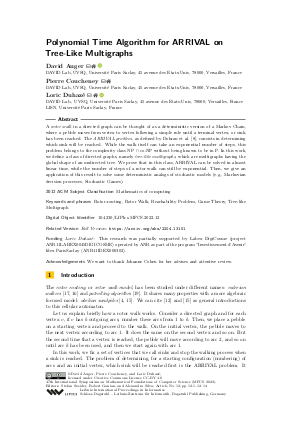Polynomial Time Algorithm for ARRIVAL on Tree-Like Multigraphs
Authors
David Auger  ,
Pierre Coucheney,
Loric Duhazé
,
Pierre Coucheney,
Loric Duhazé 
-
Part of:
Volume:
47th International Symposium on Mathematical Foundations of Computer Science (MFCS 2022)
Part of: Series: Leibniz International Proceedings in Informatics (LIPIcs)
Part of: Conference: Mathematical Foundations of Computer Science (MFCS) - License:
 Creative Commons Attribution 4.0 International license
Creative Commons Attribution 4.0 International license
- Publication Date: 2022-08-22
File

PDF
LIPIcs.MFCS.2022.12.pdf
- Filesize: 1.16 MB
- 14 pages
Document Identifiers
Related Versions
- Full Version https://arxiv.org/abs/2204.13151
Subject Classification
ACM Subject Classification
- Mathematics of computing
Keywords
- Rotor-routing
- Rotor Walk
- Reachability Problem
- Game Theory
- Tree-like Multigraph
Metrics
- Access Statistics
-
Total Accesses (updated on a weekly basis)
0PDF Downloads0Metadata Views
Abstract
A rotor walk in a directed graph can be thought of as a deterministic version of a Markov Chain, where a pebble moves from vertex to vertex following a simple rule until a terminal vertex, or sink, has been reached. The ARRIVAL problem, as defined by Dohrau et al. [Dohrau et al., 2017], consists in determining which sink will be reached. While the walk itself can take an exponential number of steps, this problem belongs to the complexity class NP ∩ co-NP without being known to be in P. In this work, we define a class of directed graphs, namely tree-like multigraphs, which are multigraphs having the global shape of an undirected tree. We prove that in this class, ARRIVAL can be solved in almost linear time, while the number of steps of a rotor walk can still be exponential. Then, we give an application of this result to solve some deterministic analogs of stochastic models (e.g., Markovian decision processes, Stochastic Games).
Cite As Get BibTex
David Auger, Pierre Coucheney, and Loric Duhazé. Polynomial Time Algorithm for ARRIVAL on Tree-Like Multigraphs. In 47th International Symposium on Mathematical Foundations of Computer Science (MFCS 2022). Leibniz International Proceedings in Informatics (LIPIcs), Volume 241, pp. 12:1-12:14, Schloss Dagstuhl – Leibniz-Zentrum für Informatik (2022)
https://doi.org/10.4230/LIPIcs.MFCS.2022.12
BibTex
@InProceedings{auger_et_al:LIPIcs.MFCS.2022.12,
author = {Auger, David and Coucheney, Pierre and Duhaz\'{e}, Loric},
title = {{Polynomial Time Algorithm for ARRIVAL on Tree-Like Multigraphs}},
booktitle = {47th International Symposium on Mathematical Foundations of Computer Science (MFCS 2022)},
pages = {12:1--12:14},
series = {Leibniz International Proceedings in Informatics (LIPIcs)},
ISBN = {978-3-95977-256-3},
ISSN = {1868-8969},
year = {2022},
volume = {241},
editor = {Szeider, Stefan and Ganian, Robert and Silva, Alexandra},
publisher = {Schloss Dagstuhl -- Leibniz-Zentrum f{\"u}r Informatik},
address = {Dagstuhl, Germany},
URL = {https://drops.dagstuhl.de/entities/document/10.4230/LIPIcs.MFCS.2022.12},
URN = {urn:nbn:de:0030-drops-168103},
doi = {10.4230/LIPIcs.MFCS.2022.12},
annote = {Keywords: Rotor-routing, Rotor Walk, Reachability Problem, Game Theory, Tree-like Multigraph}
}
Author Details
- DAVID Lab.,UVSQ, Université Paris Saclay, 45 avenue des Etats-Unis, 78000, Versailles, France
- DAVID Lab.,UVSQ, Université Paris Saclay, 45 avenue des Etats-Unis, 78000, Versailles, France
Funding
- Duhazé, Loric: This research was partially supported by Labex DigiCosme (project ANR11LABEX0045DIGICOSME) operated by ANR as part of the program "Investissement d'Avenir" Idex ParisSaclay (ANR11IDEX000302).
Acknowledgements
We want to thank Johanne Cohen for her advises and attentive review.
References
-
David Auger, Pierre Coucheney, and Loric Duhaze. Polynomial time algorithm for arrival on tree-like multigraphs. arXiv preprint arXiv:2204.13151, 2022.

-
David Auger, Pierre Coucheney, and Yann Strozecki. Finding optimal strategies of almost acyclic simple stochastic games. In International Conference on Theory and Applications of Models of Computation, pages 67-85. Springer, 2014.

-
David Auger, Pierre Coucheney, and Yann Strozecki. Solving simple stochastic games with few random nodes faster using bland’s rule. In 36th International Symposium on Theoretical Aspects of Computer Science, 2019.

-
Anders Björner, László Lovász, and Peter W Shor. Chip-firing games on graphs. European Journal of Combinatorics, 12(4):283-291, 1991.

-
Richard P Brent and Paul Zimmermann. Modern computer arithmetic, volume 18. Cambridge University Press, 2010.

-
Swee Hong Chan, Lila Greco, Lionel Levine, and Peter Li. Random walks with local memory. Journal of Statistical Physics, 184(1):1-28, 2021.

-
Joshua N Cooper and Joel Spencer. Simulating a random walk with constant error. Combinatorics, Probability and Computing, 15(6):815-822, 2006.

-
Jérôme Dohrau, Bernd Gärtner, Manuel Kohler, Jiří Matoušek, and Emo Welzl. Arrival: A zero-player graph game in NP ∩ coNP. In A journey through discrete mathematics, pages 367-374. Springer, 2017.

-
Tobias Friedrich and Thomas Sauerwald. The cover time of deterministic random walks. In International Computing and Combinatorics Conference, pages 130-139. Springer, 2010.

-
Bernd Gärtner, Thomas Dueholm Hansen, Pavel Hubácek, Karel Král, Hagar Mosaad, and Veronika Slívová. Arrival: Next stop in cls. In 45th International Colloquium on Automata, Languages, and Programming (ICALP 2018). Schloss Dagstuhl-Leibniz-Zentrum fuer Informatik, 2018.

-
Bernd Gärtner, Sebastian Haslebacher, and Hung P. Hoang. A Subexponential Algorithm for ARRIVAL. In ICALP 2021, volume 198, pages 69:1-69:14, 2021.

-
Giuliano Pezzolo Giacaglia, Lionel Levine, James Propp, and Linda Zayas-Palmer. Local-to-global principles for rotor walk. arXiv preprint arXiv:1107.4442, 2011.

-
Nir Halman. Simple stochastic games, parity games, mean payoff games and discounted payoff games are all LP-type problems. Algorithmica, 49(1):37-50, 2007.

-
David Harvey and Joris Van Der Hoeven. Integer multiplication in time O(n log n). Annals of Mathematics, 193(2):563-617, 2021.

-
Alexander E. Holroyd, Lionel Levine, Karola Mészáros, Yuyal Peres, James Propp, and David B. Wilson. Chip-Firing and Rotor-Routing on Directed Graphs, pages 331-364. Springer, 2008.

-
AM Povolotsky, VB Priezzhev, and RR Shcherbakov. Dynamics of eulerian walkers. Physical review E, 58(5):5449, 1998.

-
Vyatcheslav B Priezzhev, Deepak Dhar, Abhishek Dhar, and Supriya Krishnamurthy. Eulerian walkers as a model of self-organized criticality. Physical Review Letters, 77(25):5079, 1996.

-
Rahul Savani, Matthias Mnich, Martin Gairing, and John Fearnley. Reachability switching games. Logical Methods in Computer Science, 17, 2021.

-
Vladimir Yanovski, Israel A Wagner, and Alfred M Bruckstein. A distributed ant algorithm for protect efficiently patrolling a network. Algorithmica, 37(3):165-186, 2003.

